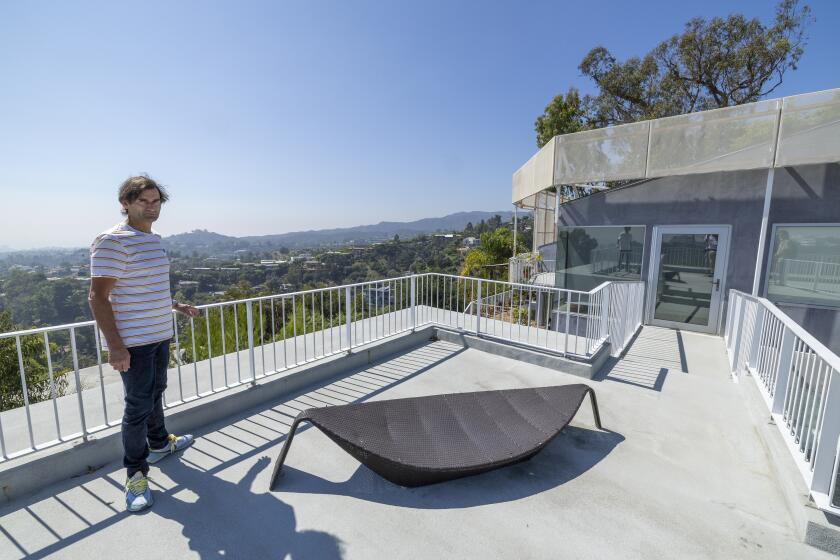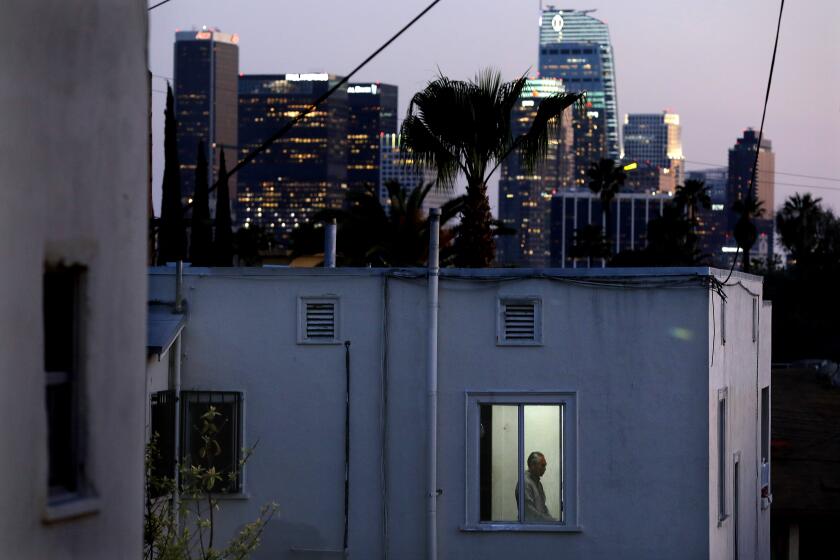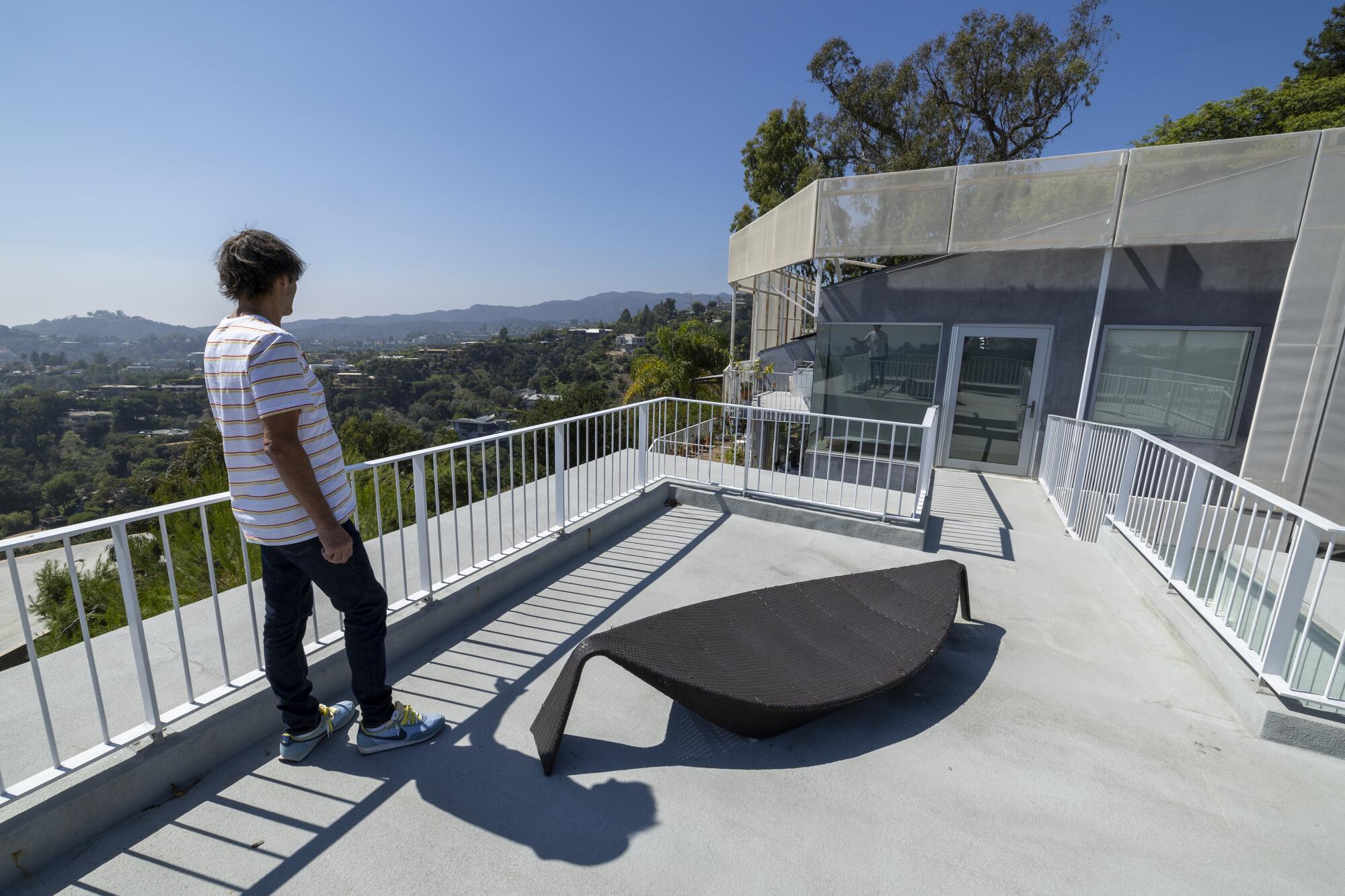
Sascha Jovanovic should be living the good life in his private estate perched in the hills of Brentwood, enjoying the spoils of a successful career in periodontics.
But instead, he says he’s scared to walk to his car because there’s a woman who won’t leave his guesthouse. She says she has the right to stay. So far a judge has ruled that, under the city’s rent stabilization ordinance, he has no legal reason to evict her.
Elizabeth Hirschhorn, who rented a Brentwood guesthouse on Airbnb and stayed 570 days without paying rent, moved out on Friday. She said she had a right to stay.
When Elizabeth Hirschhorn’s Airbnb stay ended in April 2022, she simply didn’t move out. She’s been living there rent-free ever since, and she refused to budge unless Jovanovic paid her a relocation fee of $100,000, according to a settlement offer reviewed by The Times.
Jovanovic said his hillside haven has become a hell.
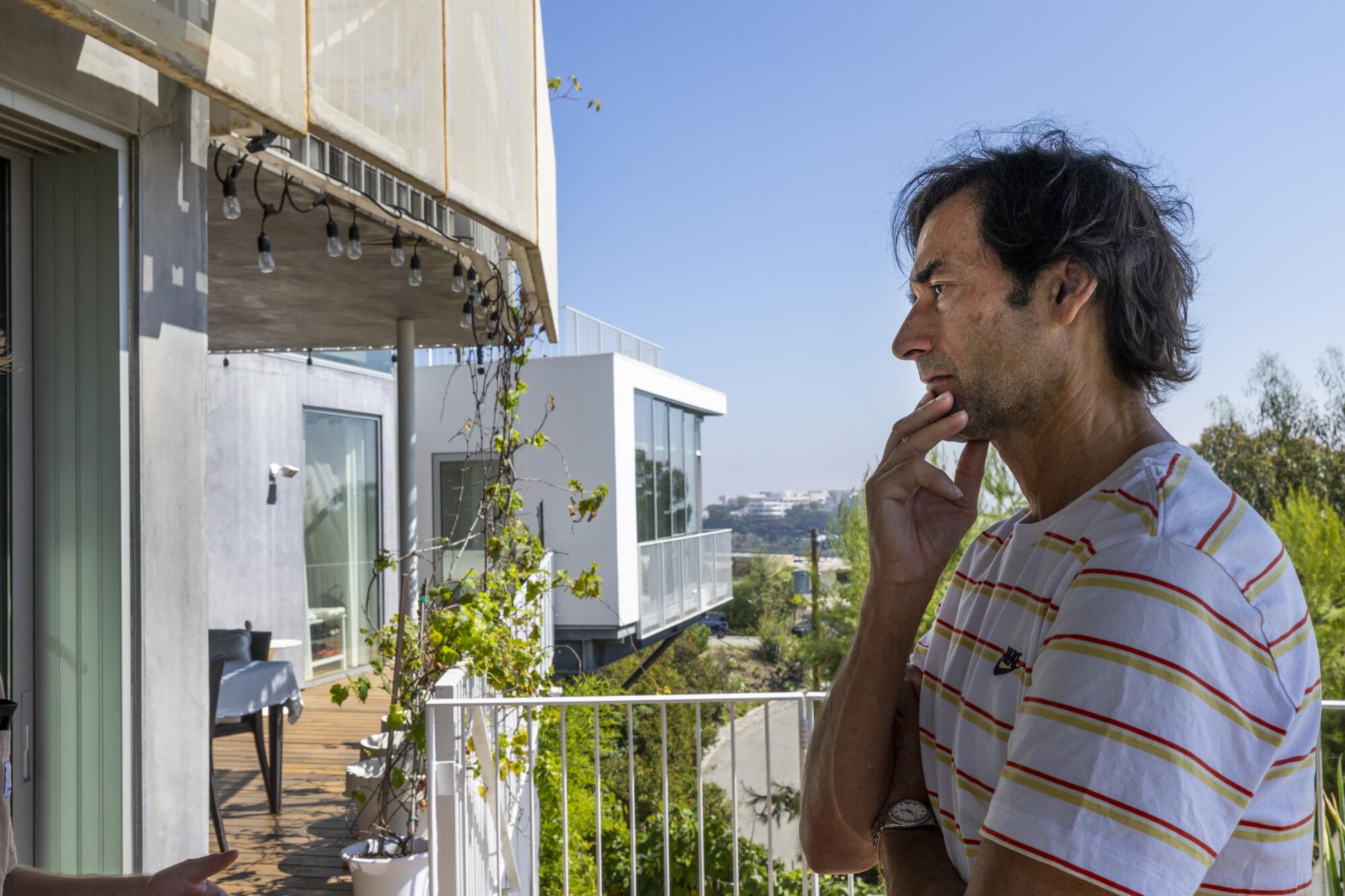
“I can never go into my home and know that I’m safe when a potentially hostile person is living there,” he said. “I’m thinking about it at all times.”
Hirschhorn declined to speak directly to The Times to give her side of the story. But her attorney, Colin Walshok, said she was not required to pay rent because the city had never approved the unit for occupancy and that its shower was constructed without a permit.
“The landlord broke the law and tried to make money by renting out an illegal bootleg unit,” Walshok said. “After he was caught, instead of doing the right thing, he has resorted to bullying, harassment and the filing of frivolous lawsuits containing elaborate false stories, all in attempt to cover his tracks.”
A war with no bullets
A native of the Netherlands, Jovanovic, 61, moved from Amsterdam to L.A. in 1990. He bought the Brentwood property five years later, and in 2010, he commissioned his dream house: a modern masterpiece designed by Lorcan O’Herlihy.
The home hovers above the city in Crestwood Hills, a tony enclave of Brentwood near the Getty Center lined with architectural gems designed by legends such as Craig Ellwood and Richard Neutra.
Wrapped in PVC-coated polyester fabric, the striking residence reflects the sun, saves on energy and brings one-of-a-kind style to its perch in the Santa Monica Mountains. A write-up from The Times called it “an ethereal dwelling that appears on the hillside at night like a glowing paper lantern.”
In 2019, Jovanovic started renting out his small guesthouse on the property on Airbnb and quickly racked up five-star reviews.
In September 2021, he approved a long-term stay for Hirschhorn. She rented it for six months at a rate of $105 per night, with fees bringing the total to $20,793 for 187 nights.
Long-term stays are attractive for Airbnb hosts because they don’t have to welcome new tenants every few days. But now, Jovanovic says he should have been concerned based on a review on Hirschhorn’s profile from another Airbnb host that said “she had a lot of particular needs that I eventually could not accommodate.”
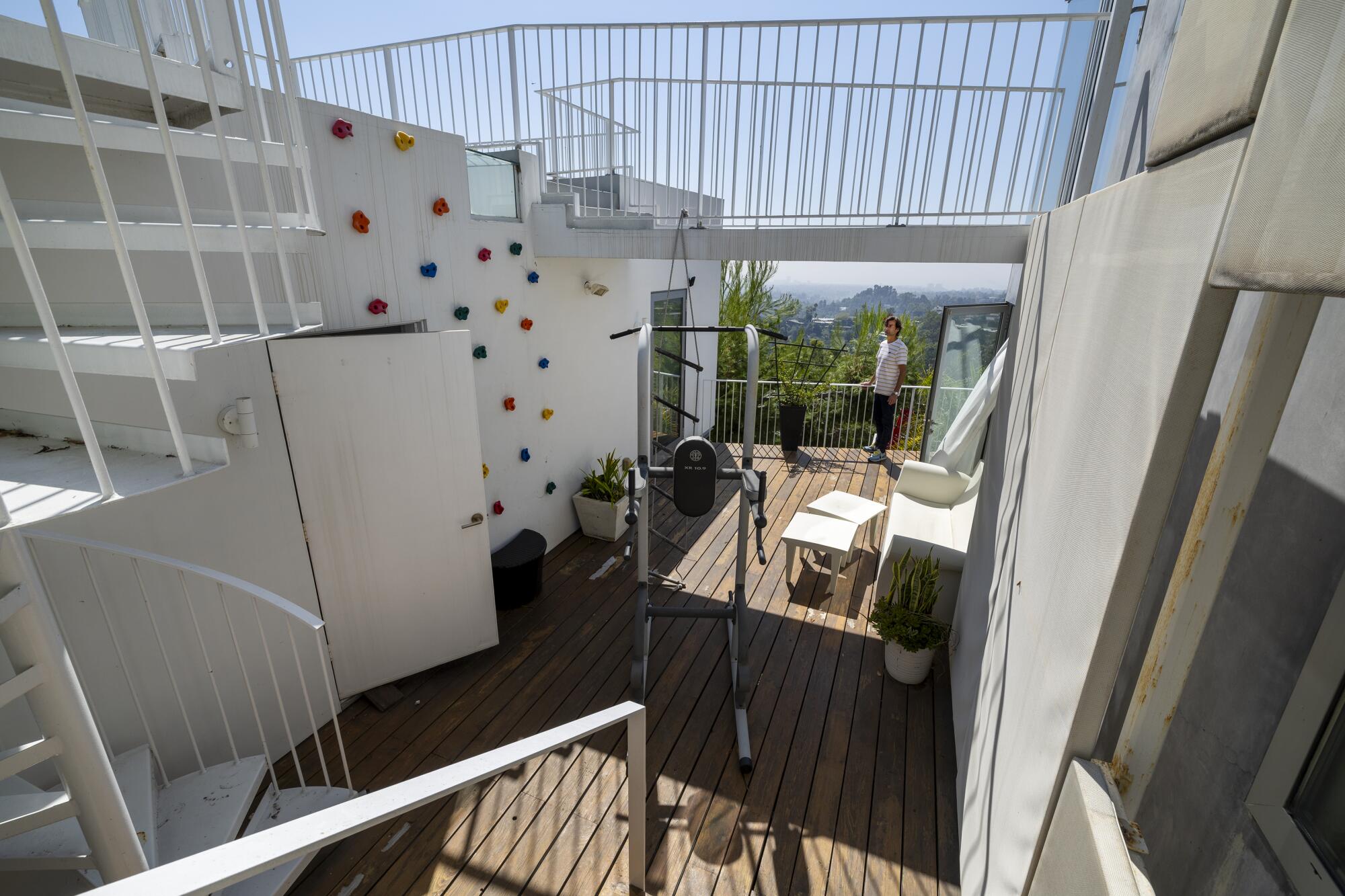
“I tried to be a kind host,” he said, standing on his deck on a sunny Monday in September, feet away from the ADU that was taken over by his tenant. “I had no idea she would become what she has become.”
The early days were pleasant. The pair exchanged niceties when their paths crossed, and they shared tea and small talk on the deck that separates the main house and ADU.
The tension, according to lawsuits they would later file against each other, began about five months in, when Hirschhorn said her electronic blinds stopped working. When Jovanovic went in to repair them, he noticed water damage and signs of mold around the sink, which he said weren’t there before her stay.
Wanting to stop the spread of mold and replace the sink, he offered to pay for her to stay at a hotel for five days while his contractor handled repairs — either the Santa Monica Hilton or the SureStay Best Western in Santa Monica, adding that many of his visiting doctors stay there. He also offered $1,500 toward a hotel of her choice, according to Airbnb messages and emails exchanged between the two included in a lawsuit Jovanovic filed later to evict her.
Hirschhorn declined, writing, “I don’t feel safe being forced to vacate with a housing disability and the high risks of Covid-19 complications.” She cited L.A. County’s COVID-19 Tenant Protections Resolution and a 2011 doctor’s note pointing out her extreme chemical sensitivities.
Jovanovic offered for her to stay in his home, emails show. Hirschhorn declined that as well, citing a disability due to extreme sensitivity to cat dander. She’s now counter-suing Jovanovic, and her lawsuit alleges that he “inappropriately invited” her to move into his house with him.
The back-and-forth lasted through the end of Hirschhorn’s Airbnb stay on March 19, 2022.
When it was clear she wasn’t leaving, or allowing any access inside, the two informally agreed that she could stay until April 12 so she could find another place, according to an email cited in Jovanovic’s complaint.
“She asked for more time, but I told her it wasn’t possible since I had other Airbnb reservations coming up,” he said. “But then I tried to be nice and give her an extra few weeks.”
Explore the latest prices for homes and rentals in and around Los Angeles.
Not satisfied with the relocation plans, Hirschhorn never left the house. The city got involved, and emails show that both Hirschhorn and Jovanovic had conversations with Pedro Gonzalez, an investigator with the city’s housing department.

Jovanovic emailed Hirschhorn: “I explained [to Gonzalez] ... that you have no reservation with Airbnb or with me after March 19/April 12 ... [and] that you have not paid for any stay after March 19/April 12.” He also said that she prevented him from repairing the property for more than seven weeks by refusing access and that in that span, damage to the dwelling increased.
In the same email, he offered $2,000 for moving assistance.
“You have no reservation after April 12 and I’ll consider you a trespasser of my property. After this date, I will use my legal rights to remove you from my property,” Jovanovic wrote.
Extending the lease beyond March 19, the original move-out date, was a major error on Jovanovic’s part; it allowed Airbnb to turn its back on the dispute. The company sent an email to Jovanovic acknowledging that Hirschhorn was staying past the date she booked, and recommended that he contact local law enforcement to remove her from the property.
Airbnb has since deleted Hirschhorn’s account, The Times confirmed from the company, but said that because the stay was extended off the platform, it’s a third-party matter that doesn’t involve the company.
“Once everything went to hell, Airbnb was out,” said Sebastian Rucci, an attorney representing Jovanovic.
April 12, 2022, came and went, and Hirschhorn did not leave.
“I can’t leave on Apr. 12 as relocation and funding plan is not in place, it would be unsafe. If you want to work something out I am willing to do that,” Hirschhorn wrote in an email.
That was the last day she paid rent, and she’s still there to this day, 540 days later.
Jovanovic tried serving her multiple eviction notices, but to no avail.
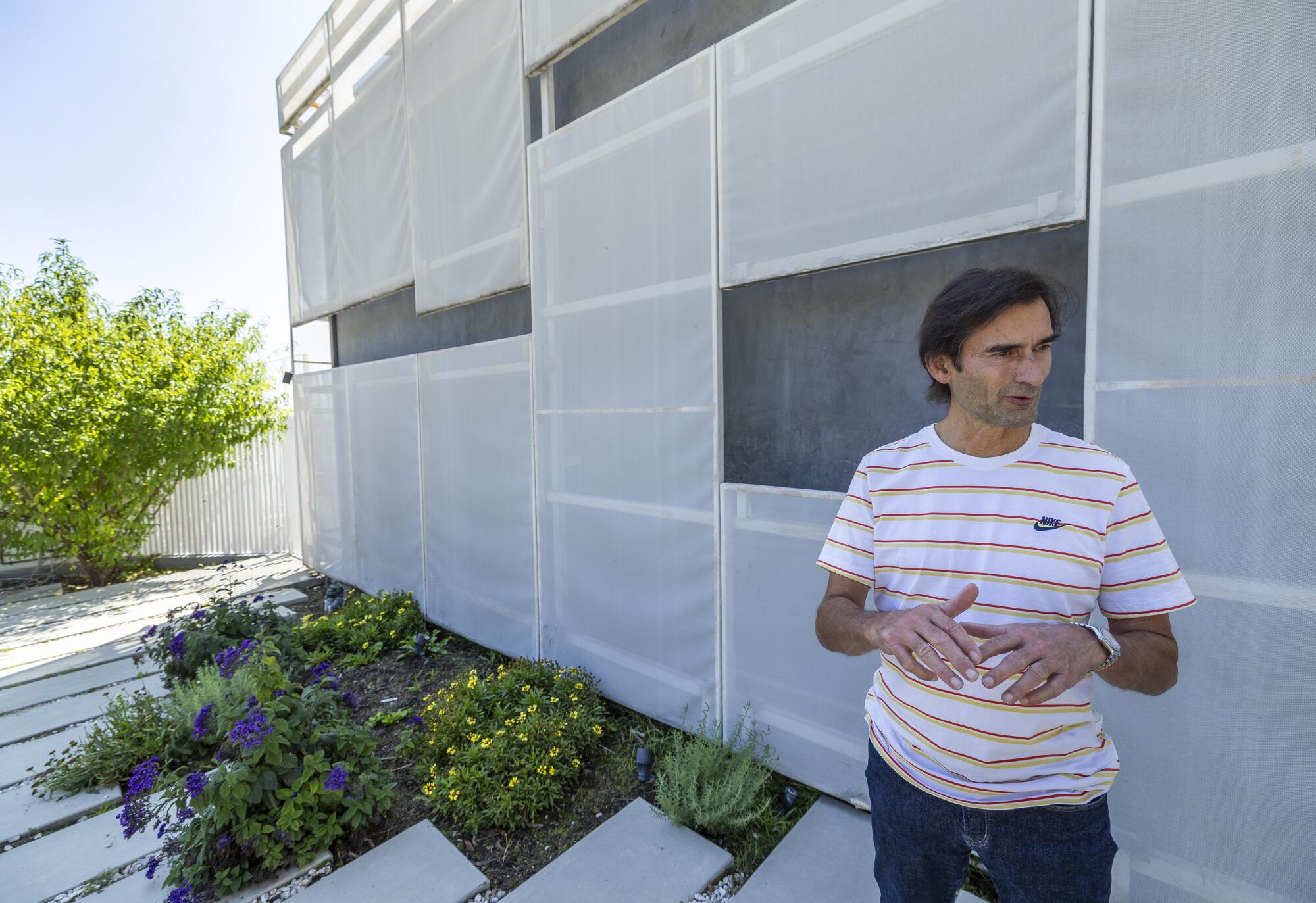
Hirschhorn in the meantime reached out to the city’s Department of Building and Safety, which found two code violations in the ADU: that it wasn’t approved for occupancy and had an unpermitted shower. She then sent a complaint to Gonzalez, the housing investigator, alleging illegal eviction, harassment and nonpayment of relocation fees. Gonzalez concluded that because the unit violated city codes, Jovanovic had to withdraw his eviction notices until he could prove that the unit was in compliance.
According to his complaint, Jovanovic tried accessing the unit to obtain the necessary permits and make repairs, but it was too late; Hirschhorn wouldn’t allow him inside. The unit is still out of compliance to this day, and last month, the Department of Building and Safety sent him a $660 fee for not complying.
Jovanovic had to cancel all his upcoming reservations for incoming guests, some of whom were coming from overseas.
“How can you stay in someone’s home for a year and a half and not have any feeling of embarrassment or responsibility?” he said. “There were some bad interactions. I would say, ‘You have to leave our house. You are a guest from Airbnb and you aren’t welcome here anymore.’”
In an email on May 31, 2022, more than a month after her move-out date, Hirschhorn wrote to Jovanovic: “Your actions and alleged repairs are made knowing that of my disability requiring accommodation, I believe it was made to harass and scare me.”
Now, the two neighbors share a property, living feet away from each other while fighting it out in a bitter legal battle.
“It’s like a war where no bullets are flying. Every time I open the door, I’m afraid she’ll be leaving at the same time,” he said. “Her door is a few feet from my daughter’s bedroom. We don’t sleep well anymore.”
He’s always on guard. Cameras are always on. Alarms are always on.
“Psychologically, it affects you. It never leaves my mind,” he said.
The relationship has devolved into a he-said-she-said conflict.
Jovanovic said Hirschhorn asked to share his mailbox, and he said no and locked it. Hischhorn’s lawsuit alleges he blocked her access to the mail.
Jovanovic said she called the police when his kids were playing music one night. Hirschhorn’s lawsuit alleges that he plays loud music outside the unit “at all hours of the day and night.”
The eviction system
Tenant-landlord disputes happen every single day in L.A.’s chaotic rental market, and the city has made attempts to protect tenants from illegal evictions and expanded those protections during the pandemic.
But it hasn’t quite gotten a handle on Airbnb, the short-term rental startup that has taken the city’s housing market by storm. Thousands of listings, many of them illegal, have sprouted up over the last decade, bringing confusion and ambiguity to a larger rental market already fraught with disputes, lawsuits and grifts.
When Jovanovic agreed to extend her stay in the ADU, Airbnb fell out of the picture, and he now has to go through the city and legal system.
Because she stayed in the unit for six months, she qualified for L.A.’s recently adopted Just Cause Ordinance. It requires a landlord to have a legal reason to evict her, and if there is no legal reason, the landlord is required to pay for relocation assistance for the tenant.
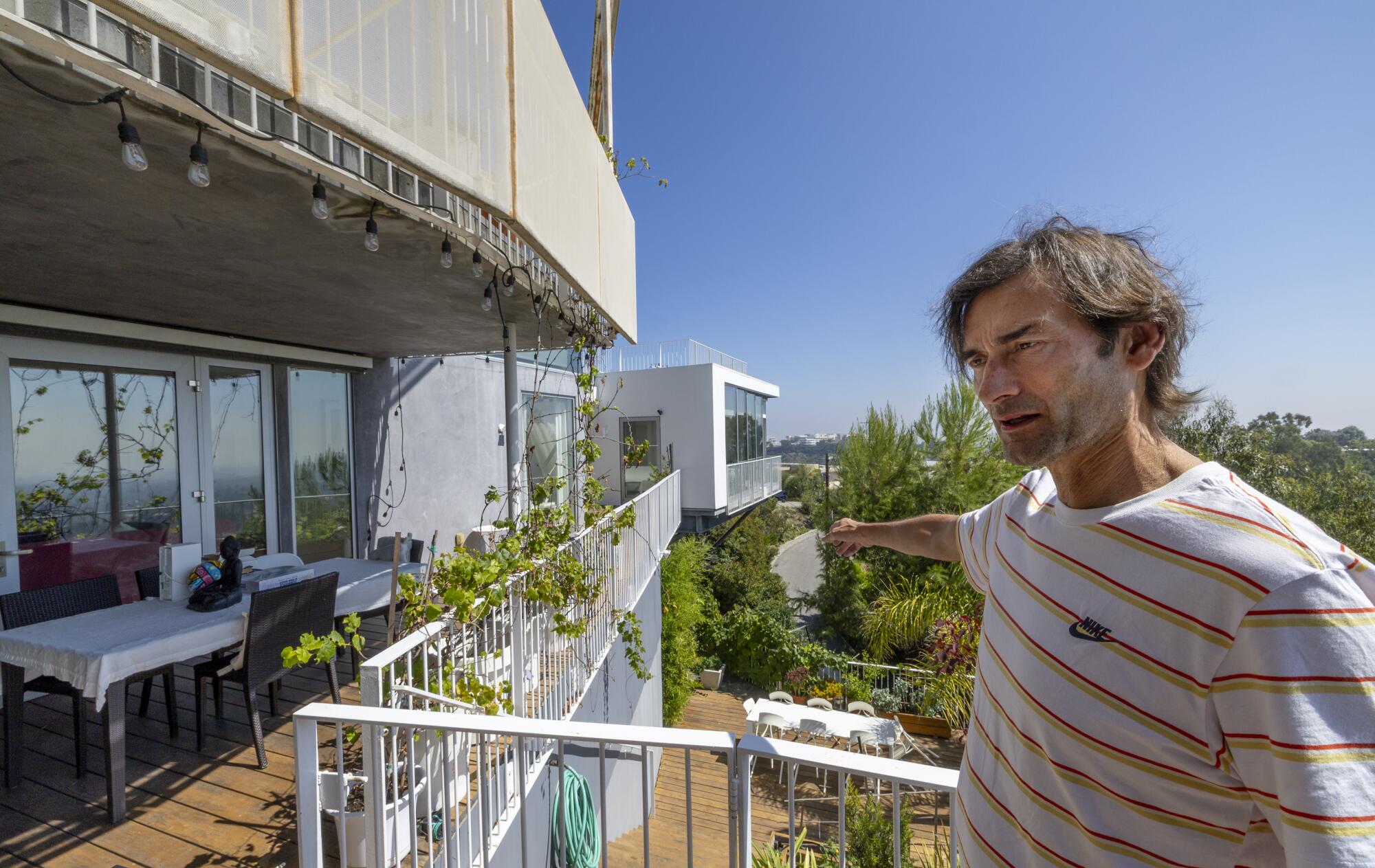
And because the unit still isn’t approved for occupancy, Hirschhorn’s legal argument is that she shouldn’t pay rent — and that she’s owed all the rent she paid during her original stay. So she stopped paying.
“As the unit did not have a certificate of occupancy, the maximum allowable rent for the unit was $0.00,” Hirschhorn’s lawsuit against Jovanovic says.
As the L.A. rental market soars out of reach for many working families, one community wants to hold on to its low-cost housing.
Gonzalez, the city investigator, also concluded that the unit is subject to L.A.’s Rent Stabilization Ordinance, giving Hirschhorn much stronger tenant protections.
The Housing Department declined to comment on the issue because it’s involved in a legal proceeding.
Rucci argues that there’s no reason the residence should be subject to rent control, and the city’s zoning map, which provides planning and zoning information for addresses, says the property isn’t subject to rent control. But he’ll have to prove it in court.
After months of back and forth, the pair tried to settle. Hirschhorn asked for $100,000, according to the settlement offer reviewed by The Times.
Hirschhorn’s lawyer, Amanda Seward, wrote to Rucci that “$100k is [Jovanovic’s] cheapest way of getting out of the whole ordeal,” according to an email reviewed by The Times.
“It is the home of the tenant until the landlord gets a judgment, however distasteful that is to your client,” Seward wrote.
Rucci then told Jovanovic to fight it in court, and agreed to take on the case for free.
“She’s the tenant from hell,” Rucci said. “If she’s right, the theory is that if a landlord has something that isn’t permitted, then you can stay in it rent-free forever.”
Rucci and Jovanovic are trying to sue Hirschhorn with two cases: a damages complaint to recoup around $58,000 in unpaid rent, and an unlawful detainer complaint to evict her.
For the eviction lawsuit, Hirschhorn’s team requested a demurrer, which is a plea to dismiss a complaint on the grounds that there’s no legal basis for a lawsuit. They argued that because there are two units on the property, the rent stabilization ordinance applies.
The judge agreed and granted it, dismissing the lawsuit. Rucci is appealing the decision.
“This isn’t about one ruling, it’s about the entire foundation,” Rucci said. “If she’s right, you can rent an Airbnb for two days and refuse to leave on the third unless the landlord pays you to leave.”
Jovanovic filed the damages complaint in May 2023 and the unlawful detainer complaint a month later. In August, Hirschhorn filed a cross-complaint, accusing Jovanovic of 15 violations, including negligence, nuisance, intentional infliction of emotional distress, unlawful business practices and violation of L.A. County COVID-19 tenant protections.
The complaint makes a litany of allegations against Jovanovic. It says he knew about the potential mold problem before Hirschhorn moved in, and that he harassed and intimidated her in an attempt to get her to leave the rental — doing unnecessary construction work outside the unit; placing rotting bags of trash outside her door; shutting off the hot water; unlawfully entering the unit; and other actions.
Walshok, her attorney, said in a statement that his client will pursue “any and all legal remedies against [Jovanovic] and anyone assisting him in his efforts to engage in ongoing illegal and harassing conduct.”
“This is not a short-term Airbnb — it was a long term rental, they had a separate long term rental agreement and there’s documentation to prove it. In fact, the City of Los Angeles has sent multiple letters to Jovanovic outlining to him why his conduct is illegal and must cease.”
Jovanovic disagrees with the ruling and is appealing. Rucci maintains that Hirschhorn is taking advantage of the system.
“This city has a housing crisis,” Rucci said. “If you want people to open their doors to tenants, don’t allow someone to do something like this.”
Life after leasing
Jovanovic doesn’t want to rent the ADU anymore — not to Hirschhorn, not to anyone.
He said it would’ve been easier to pay her off, but he sees the lawsuit as a principled stand. He admits his mistake in not knowing enough about renting to have gotten a license for the ADU, but said that shouldn’t mean that he’s never able to get rid of the person living there.
For now, his own home has been fashioned into a makeshift playroom. A Pop-A-Shot basketball arcade game stands in the corner of the deck, taking in sweeping views of the city below. Through folding walls of glass, a foosball table anchors the luxurious living room. Up above, a rope swing descends from the ceiling.
If he’s able to evict Hirschhorn, the games will go back into the recreation room for his two adolescent children.
“It would be a fantastic day for my family,” he said. “The space will turn back into a happy room.”
More to Read
Subscriber Exclusive Alert
If you're an L.A. Times subscriber, you can sign up to get alerts about early or entirely exclusive content.
You may occasionally receive promotional content from the Los Angeles Times.
